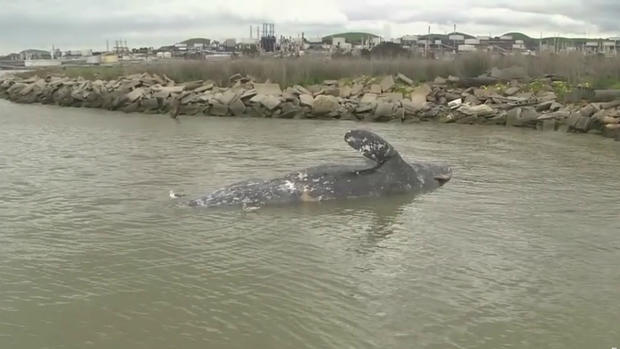Dead Whale Carcass Washes Up In Rodeo
RODEO (KPIX) -- The carcass of a dead whale washed up on the shoreline near Rodeo Wednesday, the third gruesome discovery in San Francisco Bay Area waters in less than a month.
The whale was discovered early Wednesday near a boat ramp on San Pablo Bay located at Pacific and San Pablo avenues. The Marine Mammal Center said it was a gray whale and the center and staffers from the California Academy of Sciences were to perform a necropsy to determine the cause of death.
The age, sex and length of the whale are not yet known, but marine scientists were preparing to examine the remains.
"The findings of these investigations are incredibly valuable as it is shared with policy-makers to help find long-term environmental solutions to try and help prevent these incidents in the future," Chief Research Pathologist Padraig Duignan said in a statement.
The discovery comes nearly three weeks after the carcasses of two other young gray whales washed up on a beach at Angel Island. A pod of five gray whales had been spotted in the Bay days earlier in the Bay.
"The biologists are thinking that perhaps it's an unusual abundance of some kind of food that's attracting them in here this year -- shrimp or something like that," said Duignan after the March deaths.
The whales are on their yearly migration from the warm birthing waters off the coast of Baja en route to the summer feeding ground in Alaska where they pack on the blubber.
At least one of the animals studied by the Marine Mammal Center, a female, was severely malnourished.
"Right now, they're heading for Alaska. They're in the poorest body condition they're ever going to be in because they've gone through the winter with no feeding," said Dr. Duignan.
The yearling didn't appear to have enough fuel to make the journey.
"The most significant thing was that she just had no body reserves left. She had some blubber depth but she had subcutaneous fat, she had no internal body fat. These are reserves that any animal -- human or animal -- needs to maintain body temperature and normal function," Dr. Duignan explained.
This pair marks the second and third dead gray whales found in the Bay in the past two years. There is a growing worry among biologists that this is a marker that the environment in Alaska is changing and endangering the whales.
"It has to be a concern for us. It has to be an area of warning that perhaps something is changing drastically in their habitat in the north in the arctic waters, that they're not getting enough food," Dr. Duignan said.




